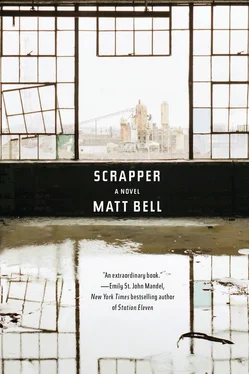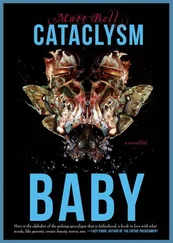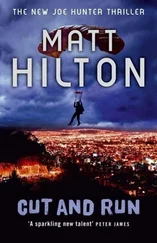He would live but he wouldn’t live in joy. There would be no more gladness. He was a thing running its course. Empty as a river. Moral as a river. Until the earth opened up and swallowed it whole, spring and source and the carve of its route.
A man living in the forest. A man who had lost everything he’d ever loved. Somewhere in the distance Pripyat waited outside the future and somewhere beyond that the plant did the same. All the Soviet architecture, Stalinist development plans. Districts of brick masonry, wet-stucco walls. Cities designed to last forever. The glory of empire. Pripyat, the ninth atomograd, the ninth nuclear city. Once fifty thousand Soviets strong and now who was left. A few stragglers, a few returning refugees.
A story of perseverance but against what? The Soviet world had ended. Pripyat endured, the evidence of its failure. What the Soviet world had wrought. Was there anywhere else on earth, the last man wondered, that had ever indicted a nation so fully? Did every other nation contain a city whose failure cast such fear, such wide and lasting doubt?
He dropped the kindling onto the snow, fell to his knees. The old grief was heavy upon him again but he couldn’t stay there long. The cold only killed you if you couldn’t keep moving. When he stood he took his knife from his pocket, placed its blade against the flesh of an unmarked tree. He remembered her name into its bark, carved the crooked memory. In his youth, he might have carved a plus, might have carved an and. He had been so sure then of his name, of who the man so named was, would become. Now he was not so sure. Or else he would not admit who he was. Only the last soul living in this frozen forest. Nameless to any who might see him, any beast or man. Walking, gathering, surviving. Reading everywhere the name of the woman he’d loved. The best thing he’d known between birth and death, between the air and the ground. Her name, of which too much was asked. Because what was a name. Because what was a name, even a name you could see in the skin of every tree, against the colorless evil of the earth, of every inch of dirt.
THE ARENA HAD SPECIAL SEATING for the handicapped and their caretakers, designated entrances. Kelly showed the parking-garage attendant their tickets, then followed the attendant’s directions to push the girl in her wheelchair out onto a street named for one of her heroes. When he said the name and pointed at the sign, her head didn’t move but he thought she might have shifted her eyes. They had lived together for almost a year now and he had spent the first months learning the new range of her expressions, had started to recognize the small differences between a good day and a bad day, slight shifts in her mood and movements.
In the handicapped section he cataloged the previously unimagined configurations of men and women, their varied dependencies, the results of age, disease, awful chance: An old man with an oxygen tank strapped to his walker, linked armed in arm with a woman who must have been his daughter. Another woman in a wheelchair, her limbs distorted, her age impossible to determine through her deformity. A teenager ancient in his seat, his head wobbling, mouth open, full of soft teeth and dumb sound. All of them dressed in the same red jerseys as anyone else, loose over their differences. The other wheelchairs decorated with stiff flags, bumper stickers for the team, the city, other abstracted allegiances.
The game hadn’t started yet. There were twenty-ounce beers available for nine dollars twenty feet away but he didn’t want to take her with him to get one, didn’t know how to ask someone else to watch her. There wasn’t much she needed but he wouldn’t leave her alone. To not leave her was the rule. There was a backpack hung over the back of her chair and it contained most of what she might require. Whenever he remembered he kept one hand on her shoulder, let her know he was there. He talked more now than ever before. She couldn’t talk but she could make some sounds and he applied certain kinds of sense to each. There wasn’t as much hunger in her as before but she was putting on weight, acquiring a sedentary sag to her flesh. They didn’t have sex anymore but one of his tasks was to lift her naked in and out of the tub, to rub soap and sponge over her sore skin. Up close there was still something sexual about her body but sooner or later he stepped back.
He was thirsty and he knew caretakers left their charges, took breaks by stranding them in other rooms. Maybe it wasn’t right to leave your charges behind when you went to the store or the bank but sometimes it seemed impossible to bring them along. The caretakers learned how to be alone again, despite the work. When and where, even with someone else in the room. You took money from the government for caring for your own disabled person but presumably you loved the person too because the money was shit. Nothing given ever replaced what was given up.
He didn’t care what anyone else did. He never left her behind, took her everywhere with him. They were sharing a life and this was it. At home he lifted her out of the chair and into the bath, out of the bath and into the chair, into the bed, into a recliner in her living room, into the passenger seat of her car. Twice a week she went to physical therapy where the therapists moved her muscles like she was a coma patient laid out on a mat in a room of the similarly injured.
The doctors said this was the best it would ever be again. They said this to him and he asked them to talk to her. She was the patient. They were her doctors, not his.
She had asked him if he understood what was coming but he couldn’t believe either of them imagined this. The difference between being told and being there. At first he’d thought what had happened to her was his fault: an eye for an eye, a pound of flesh to pay a debt, the taking of the girl for the taking of the brother. But this only was the old belief talking, the remnants of childhood, the holy before. The world without doubt. Even if she had never met him this was going to happen. He wasn’t the center of anything. Nothing revolved, nothing was attracted or repulsed by his command.
Every day he told her another secret and the knowledge didn’t make her any sicker. He was careful to pace the telling, to make it last. There was only so much of him left.
He wasn’t sure what she heard. Or if she heard, did she understand? Her eyes were alive and expressive enough but it wasn’t like he saw words in her gaze, it wasn’t like there was actual conversation happening between them.
He told her about the low room, how he had named it and prepared it, how he had hurt the brother there. He tried to tell her why. He wouldn’t think the brother’s name but the brother’s last face lingered still. There was a photo the news showed but it wasn’t the face he’d seen in the dark. This was another person entirely, someone with parents, a school to attend, a future requiring having left the room. He’d made the brother something different, an abstraction in the dark, he’d hurt him to protect the boy, to remove a single danger from the boy’s world.
Time and distance might have done the same work. He’d chosen to accelerate it. To not let a harm he could prevent continue even a single day longer.
I lied myself into belief, he’d told her, in the first days of the wheelchair. It was a crime of impatience, of wanting to ensure causal effect. I was impatient with the good acts of others, he’d said. Because I knew the good was nothing anyone could see enough to fear. Goodness alone stopped nothing.
But then the lie’s comfort had deserted him in the last moment. By the end the lights had been off and he had worked in the blackness, imagining whatever he couldn’t have seen. Now every night he remembered that imagining, relived it again.
Читать дальше












